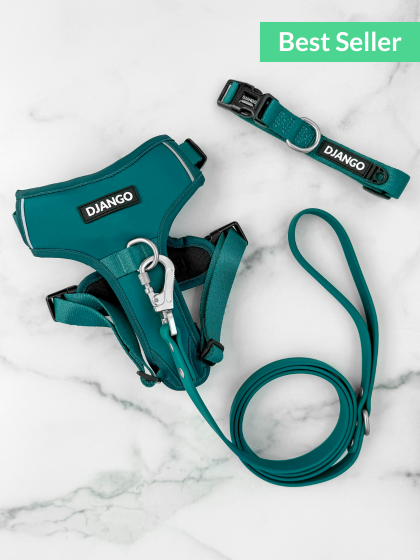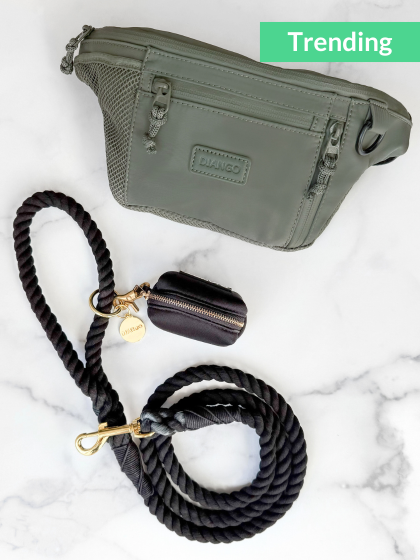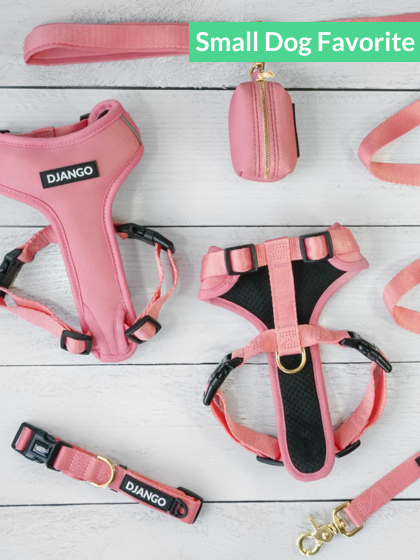CBD has quickly become the trendiest new supplement in the pet and canine wellness world. An endless number of companies now offer and promote CBD oils, balms, and gels for a myriad of canine health and wellness issues ranging from travel anxiety to nervousness, nausea, aggression, and even canine epilepsy.
But what exactly is CBD, and what conditions does CBD oil for dogs treat? Is CBD truly safe and beneficial for our four-legged family members? Are there known side effects and risks with ongoing CBD usage? What should we as loving dog owners know about CBD oil before giving it to our dogs?
Although we (Mike and Steph) have never given CBD to our long-haired dachshund Django—fortunately Django is young, in good health, and exceptionally calm—we felt it important to share information about this incredibly popular product that can be found in almost every pet store around the globe.
Here is everything you need to know about CBD and CBD products for dogs.
What are CBD and CBD Oil?
Cannabidiol (CBD) is a non-psychoactive and non-toxic cannabinoid that comes from cannabis plants, commonly known as marijuana and hemp. Cannabis plants contain an array of phytocannabinoids, but CBD and tetrahydrocannabinol (THC) are the most well-known phytocannabinoids. Unlike CBD which is non-psychoactive, THC produces a psychoactive effect or "high" in humans and dogs alike—the same high one gets from smoking marijuana.
Understanding the difference between marijuana and hemp
Marijuana and hemp both come from cannabis plants, but they are technically different things. Marijuana comes from the plants' leaves, buds, and resin. Marijuana contains CBD and very high levels of THC, the psychoactive phytocannabinoid that causes a high.
Hemp refers to the rest of the cannabis plant. Unlike marijuana, hemp is non-intoxicating and contains less than 0.3 percent THC.
While the United States Drug Enforcement Administration (DEA) lists marijuana as a Schedule 1 drug under the Federal Controlled Substances Act, or a drug "with no currently accepted medical use and a high potential for abuse", the FDA does not classify hemp as a Schedule 1 drug. For this reason, CBD obtained from hemp is legal throughout the United States.
So what exactly is CBD Oil for dogs? Is CBD Oil different from Hemp Oil?
After being extracted from hemp, CBD is typically diluted with other oils (i.e. dog-friendly coconut oil) to form an ingestible substance that can be added to your dog's dinner bowl. Although some CBD oils marketed to pet parents are organic and all-natural (i.e. made with organically-sourced CBD, non-GMO, free of pesticides, free of preservatives), others may contain chemicals, preservatives that extend product shelf life, or fillers.
CBD oils for dogs and pets are often marketed as "hemp oil" since CBD is derived from hemp (and not marijuana). You may assume the terms "CBD oil" and "hemp oil" are interchangeable, but this is not always the case.
CBD oils containing beneficial phytocannabinoids are based on "hemp extract oils". "Hemp extract" or "hemp extract oil" are the terms you should look for in the ingredient list when shopping for CBD oil.
Other products frequently marketed as "Hemp Oil" are made with "hemp seed oil". Hemp seed oil comes from the seeds of hemp and does not contain the beneficial phytocannabinoids found in hemp extract.
Both CBD oil and hemp seed oil can be marketed as "hemp oil", so always be sure to read the full ingredient list before making any purchase.
HOW DOES CBD FOR DOGS WORK?
Dogs, like humans, have an endocannabinoid system. Our endocannabinoid system regulates many important biological functions in the body including sleep, appetite, mood, memory, and pain modulation.
Your dog’s endocannabinoid system contains CB1 and CB2 receptors. CBD binds to these receptors in the brain, spinal cord, and nervous system. This binding can help re-balance key biological functions and lead to benefits we've come to expect with CBD use: inflammation reduction, pain mitigation, appetite stimulation, anti-anxiety, and anti-nausea, to name a few.
ARE CBD OILS SAFE FOR DOGS?
CBD oils produced from reputable companies are generally considered safe for dogs. A 2018 study on the use of cannabidiol to treat canine medical conditions surveyed licensed veterinarians throughout the United States. Most veterinary participants supported the use of CBD products (mainly oils and edibles) for animals and suggested that cannabidiol is a useful treatment for pain, anxiety, and seizures.
With that said, dog owners should be incredibly careful which CBD products they buy for their dogs and what companies and websites they buy from. Almost anyone can market and sell CBD products to well-meaning dog owners since CBD products are not regulated by the U.S. Food and Drug Administration (FDA). Unfortunately, not every company selling CBD pet products has you and your dog's best interests at heart and may provide misleading or downright false information and claims about their particular product.
A general rule of thumb is to avoid buying CBD oils from third-party marketplace sites like eBay, Etsy, and Amazon unless you know and trust the seller.
As Dr. Joseph Wakshlag, the chief medical officer at ElleVet Sciences, explained to us, “There's a lot of tomfoolery and shenanigans going on out there when it comes to CBD oil."
Dr. Wakshlag studied 13 commercially-available CBD oils for dogs. He found that 20 percent of the CBD oils had less CBD than their packages said. Two products actually had no CBD (you read that correctly - zero CBD in products marketed as "CBD oils"), and several products contained unwelcome chemical preservatives added to extend product shelf life. “There also are a lot of CBD companies basing their claims on human or rat data,” Dr. Wakshlag told us.
Dr. Wakshlag recommends calling CBD companies to ask for their certificate of analysis. “Ask for the last three batches to make sure that their product is consistent,” he says. “They could have 25 mg per mm one month and 6 mg per mm the next.”
If you are considering purchasing CBD oils for your dog, please consult your licensed veterinarian first. You vet should be able to point you to a trustworthy CBD brand and product appropriate for your dog based on his or her health condition and needs.
WHAT CONDITIONS DOES CBD OIL TREAT?
Although there is very little research on CBD and its effectiveness in treating various canine health conditions, CBD oil is often used to treat the following ailments in pets:
- Anxiety
- Nervousness
- Pain management
- Inflammation
- Nausea
- Low appetite
- Joint pain
In addition to the above, CBD is frequently used as a supplemental remedy for:
Atopic dermatitis
Atopic dermatitis (often called eczema) affects 10 percent of dogs. Golden retrievers, poodles, Shih Tzus, cocker spaniels, and bulldogs are more likely than other dog breeds to have atopic dermatitis.
Atopic dermatitis is typically caused by grass, mold spores, or dust mites. Your dog may have red, greasy, or tough skin that smells like yeast. Symptoms include itching, scratching, rubbing, and licking.
One 2015 study found that CBD oil decreases skin itchiness and slowly heals it. Dr. Wakshlag also told us that CBD oil may also lessen allergies when it is used with other medications, such as Apoquel and Atopica.
Genetic Epilepsy
Genetic epilepsy is the most common cause of seizures in dogs. It often occurs in male dogs between six months and six years of age.
One in 20 dogs—at some point in their lifetime—will experience repeated seizures that last for five to 30 minutes. According to BMC Veterinary Research, genetic epilepsy occurs more often in large dog breeds (e.g., border collies, German shepherds, and Labrador retrievers). It is also common in mixes of at-risk breeds, such as goldendoodles and bodacions (border collie and dalmatian mixes).
Dr. Stephanie McGrath is a neurologist at Colorado State University Veterinary Teaching Hospital. In a 2019 pilot program, Dr. McGrath treated nine dogs with CBD oil and seven dogs with a placebo for twelve weeks. All dogs in the study continued to receive anticonvulsants, such as phenobarbital and potassium bromide. Dr. McGrath found that 89 percent of dogs receiving CBD oil had fewer seizures.
Osteoarthritis
CBD oil is often used for dogs with osteoarthritis since it helps to soothe canine joint pain.
Twenty percent of dogs have osteoarthritis. Car accidents are the most common cause of this wear and tear disease. Osteoarthritis can also be caused by infectious diseases (e.g., Lyme disease and systemic lupus erythematosus), genetic conditions, and obesity. According to Banfield Pet Hospital’s 2020 State of Pet Health Report, 52 percent of dogs with osteoarthritis are also overweight or obese.
Dr. Wakshlag gave dogs 2 or 8 milligrams of CBD oil per kilogram of body weight every 12 hours for 4 weeks. Eighty percent of the dogs had less pain and more flexibility. “GRPV and glycine interceptors interact with CBD and dampen the signal that goes up the spinal cord for pain,” he explains.
HOW MUCH CBD OIL SHOULD I GIVE MY DOG?
One study determined that about 1 mg per pound of body weight given twice daily was the optimal dose to treat arthritis in dogs. Unfortunately, there is limited research on what CBD dosages are most effective at treating other health conditions in dogs.
As Dr. Liz McCalley, the medical director for Purple Paws Pet Clinic, explained to us: “It is still largely unknown what dose is best to help with other conditions. I recommend that pet parents start with a lower dose and then gradually increase to the lowest effective dose for their dogs”.
Please consult with your veterinarian before giving your dog CBD oil and to confirm the appropriate dosage based on your dog's weight and unique health needs.
SIDE EFFECTS OF CBD OIL
Generally speaking, CBD oil for pets is considered safe and non-toxic. With that said, it is important to be aware of any potential side effects and risks that could result from CBD usage. The following side effects have been associated with canine use of CBD oils and products:
- Dry mouth. CBD oil can cause dry mouth that affects your dog’s teeth and gums. Dry mouth can cause bad breath and make it painful for your dog to swallow. If a dog drinks too much water in a short period of time, his or her electrolyte levels can become imbalanced. That can cause difficulty breathing, uneven heart rate, muscle weakness, seizures, and bone fractures.
- Diarrhea. In a 2018 study, 30 beagles were given CBD-infused capsules, oil, or cream for six weeks. All 30 beagles participating in the study had diarrhea and were treated with antibiotics (i.e., metronidazole). “The episodes of diarrhea were suspected to be secondary to the CBD treatments,” Dr. Liz McGrath explains. “Dietary variation, including treats, and stress could not be ruled out.”
- Vomiting. In a study carried out by Dr. McGrath, 20 percent of dogs vomited when they received CBD capsules or oil. CBD oil tastes bitter with a distinct earthy flavor. For this reason, it is not unsurprisingly that dogs typically dislike the taste of CBD oil in their mouth or dinner bowl.
- Low blood pressure. High doses of CBD can cause a temporary drop in canine blood pressure. Low blood pressure in dogs can result in fatigue, confusion, increased thirst, excessive urination, and fainting.
- Drowsiness. CBD oil might make your dog slightly drowsy since there is a small amount of tetrahydrocannabinol (THC) in it. THC is the substance in marijuana that causes a "high". According to the National Sleep Foundation, most dogs sleep 12 to 14 hours per day. If your dog's sleeping habits change after he or she begins taking CBD, please contact your veterinarian as soon as possible.
- Drug interactions. CBD oil causes minor liver enzyme elevations. Since CBD is metabolized in the liver, it may cause negative drug interactions with prescription medications. When used in conjunction with other prescription drugs, CBD may cause toxic levels of the prescription drugs to enter the bloodstream. "This is why it is very important for pet parents to speak with their veterinarians before giving CBD to their dogs, especially when their dog is receiving other medications,” Dr. McCalley says.
HOW MUCH DOES CBD OIL COST?
CBD oil for dogs is often sold in one-ounce bottles with a medicinal dropper. The cost for these typically start around $20 and can go up to $45 depending on the brand and quality of ingredients.
Prices for other CBD pet products (capsules, soft chews, baked treats, balms, gels, etc) vary widely and cost anywhere from four cents to $3 per mg.
ONE LAST THOUGHT
CBD oils can certainly be beneficial for dogs depending on the animal's unique health and wellness needs. With that said, there is very little research on CBD and its effectiveness in treating various canine health conditions. There are potential side effects that could result from CBD use, and there are also a ton of unregulated CBD products on the market. For these reasons, please always consult your licensed veterinarian before giving your dog any CBD product.













